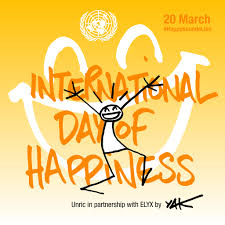
As the nation joins the rest of the globe in marking the UN International Day of Happiness, some residents of the Federal Capital Territory (FCT), on Tuesday argued that many Nigerians are not happy.
The Sustainable Development Solutions Network (SDSN) had earlier on March 14 released the 2018 World Happiness Report, ranking Nigeria as the 91 happiest nations of the world, and fifth in Africa.
As indicated by the report, Nigerians seems to be happier now, as the country moved up from its previous position of 95 at the global level, and sixth in African in 2017.
Nigeria’s position showed that in spite it’s economic, security and other challenges, its citizens remained happy.
However some of the residents said that although the SDSN report indicated that Nigeria was faring better in terms of citizens happiness, the reality was that many Nigeria’s were actually `suffering and smiling.’
They therefore said that celebrating the day was of no or little significance to them.
Mr Sunday Adams, an unemployed graduate, noted that Nigerians were dogged and could survive in any circumstances, and that should not be misunderstood as happiness.
He added that unemployment, insecurity and inflation were actually making ordinary Nigerians unhappy.
” Acting happiness is different from being happy, because genuine happiness is a reflection of what is happening to you and around you.
”I am personally not happy judging from the recent hardship Nigerians are going through, as prices of food stuff have increased, there are no jobs and thousands of Nigerian cannot feed properly.
”There are no employments for the youths and worse of all, most companies now embark on mass retrenchment of workers,he said.
Also, Mrs Victoria Uchena, a Civil Servant, noted that Nigerians naturally have happy dispositions, noting that successive leaders have failed them over the years and that their happiness does not depict good standard of living.
”I don’t think Nigeria is supposed to celebrate the day or being rated among the first 100 happiest countries in the world.

”What is here to make us happy? Is it the killings OR kidnapping our women and children? Or the lack of electricity supply for poor artisans to make ends meet?
”There is nothing that is actually making us happy at the moment, apart from being alive and hopeful,’’ she added.
Smilarly, Mr Desmond Calistus, a recreational centre owner, noted that there were increasing news of suicide, rape and other vices which indicated that all was not well.
He noted that the rate of increase in crimes, especially by young people who now abuse all forms of drugs as an escapist therapy, showed that people were looking for false happiness.
”I don’t think we should celebrate this day, looking at the whole challenges that our politicians have created for us through past leadership.
”When you ask 100 people, I believe they will all tell you they are not actually happy, but they just choose to be happy as individuals, because when there is life there is hope,’’ he said.
Another resident, Mr Kelvin Thomas, who was in company of his friends drinking and taking a plate of pepper soup, said that clubbing and partying were not actually signs of happiness, as many people merely do that to suppress challenges.
”Anyone who tells you he or she is celebrating happiness today is not sincere because the economic hardship continues to bite harder, and more people especially the breadwinners are under serious pressure.
”I don’t know the criteria which they use in rating the happiest countries, but let us be realistic, majority of Nigerians are not happy at the moment.
“Maybe the elite and our National Assembly members are the only ones that are happy.
”Corruption, kidnapping and herdsmen killings are going on , and our hospitals lack facilities, schools are in bad shape, no money and no food for the common man, and you are saying we should celebrate?” he asked.
Recall that the International Day of Happiness, which started in 2013, is celebrated worldwide every March 20, to inspire, mobilise, and advance the global happiness movement.
The day is preceded by the release of the World Happiness Report, a landmark survey of the state of global happiness, aimed at influencing government policy.
The report reviews the state of happiness in the world and shows how the new science of happiness explains personal and national variations in happiness.
It reflects a new worldwide demand for more attention to happiness as criteria for government policy.
The report assessed happiness levels of countries based on six factors – per capita gross GDP, healthy life expectancy, freedom, generosity, social support and absence of corruption in government or business.








